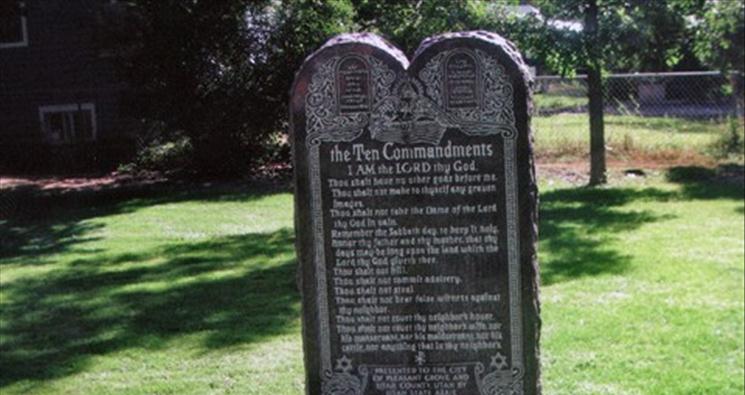Summum v. Pleasant Grove City: The Concluding Chapter Begins
Almost eight years ago, in July of 2005, a new age religious group called Summum filed a lawsuit against Pleasant Grove City, Utah. The group claimed that the city’s decision not to display a stone monument bearing Summum’s “Seven Aphorisms” in a city park violated the Free Speech Clause of the First Amendment. Summum argued that because the city park contained a Ten Commandments monument donated by the Fraternal Order of Eagles the city had to display Summum’s Seven Aphorisms as well. Although all items displayed in the city park, called Pioneer Park, reflect the city’s pioneer heritage or were donated by groups with longstanding ties to the community, by Summum’s own admission its offer to donate a monument met neither of these criteria.
After the city prevailed at the federal trial court and Summum prevailed at the court of appeals, the U.S. Supreme Court decided to take the case. In November, 2008, three years after Summum first filed its lawsuit, ACLJ Chief Counsel Jay Sekulow argued the case before the Supreme Court on behalf of the city (you can listen to the argument here) and three months later the Court handed down its decision.
The Court ruled in favor of Pleasant Grove unanimously. In an opinion by Justice Alito, the Court held that when it comes to displaying monuments on public lands -- a historical practice of governments since time immemorial -- the government is the speaker and has the right to “speak for itself,” “say what it wishes,” and “select the views it wants to express.” In other words, the Free Speech Clause doesn’t require the city to display Summum’s Seven Aphorisms because the city displays a Ten Commandments monument.
The decision had immediate consequences, not just for Pleasant Grove, but for all state and local governments in the nation. Under the Court’s decision, a city doesn’t have to display a sign denouncing Christmas if the city chooses to have a display that celebrates the season. A city would no longer have to remove a Ten Commandments monument in order to avoid displaying a disgraceful monument donated by the infamous Westboro Baptist Church.
One would think that a decision by the U.S. Supreme Court, not to mention a unanimous one, would put the issue to rest. Far from it.
After Summum lost on its Free Speech claim, it went back to the federal trial court to argue that the city’s decision violated another provision of the First Amendment: the Establishment Clause. In an argument all but identical to its Free Speech claim, Summum argued that the city’s display of the Ten Commandments, but not the Seven Aphorisms, was an impermissible endorsement of religion.
The district court was not persuaded by Summum’s attempt to put a new label on its defunct free speech claim. In his opinion, Judge Dale Kimball wrote, “there is no evidence that anyone in Pleasant Grove government had any idea what Summum’s religious beliefs were, and thus it cannot be said that the Pleasant Grove government demonstrated a preference for one religion over another.” Summum’s case against Pleasant Grove was dismissed from federal court once and for all.
This too, however, was not good enough for Summum. Six years after filing suit in federal court, and ultimately losing on each of its federal claims, Summum filed suit against Pleasant Grove in Utah state court. Here, Summum argued what it has always argued (if a city displays a Ten Commandments monument, the city must also display a Seven Aphorisms monument), except this time said the city’s decision violated the establishment clause of the Utah State Constitution. (Summum maintained from the start that the city had violated the State Constitution, but could never persuade a federal court to rule on the claim.)
After months of briefing and an oral argument heard one year ago, the trial court ruled against Summum and in favor of the city. Judge Howard wrote that “[t]he benefit described by Plaintiff . . . of one group being allowed to erect a monument while another group is denied the same privilege, simply does not exist.”
Almost one year after Judge Howard’s decision, we have now reached the final stage of Summum’s eight year long quest to force its monument on Pleasant Grove. Yesterday, Summum filed its opening brief with the Utah Supreme Court asking that it reverse Judge Howard’s ruling and force Pleasant Grove to display a monument it does not wish to display.
We have represented Pleasant Grove every step of the way through years of litigation and will continue to do so. We will file our opposing brief this summer and will later present oral argument on behalf of the city.
The Utah Supreme Court, the last and final court to hear Summum’s claim against the city, will have to decide whether the city can continue to display the Ten Commandments without having to display Summum’s Seven Aphorisms as well. The answer to this question should be a resounding “Yes.”
We will continue to keep you posted as the case of Summum v. Pleasant Grove City moves through this concluding chapter.
